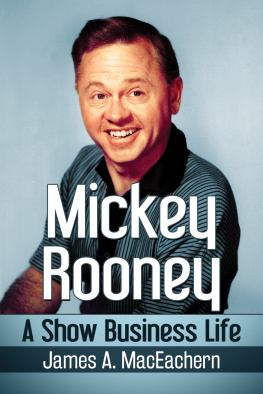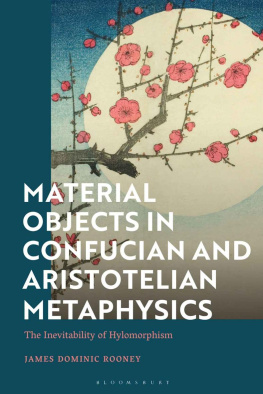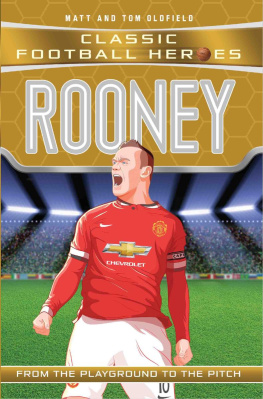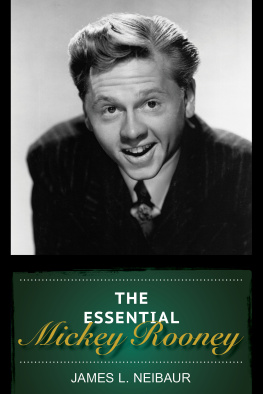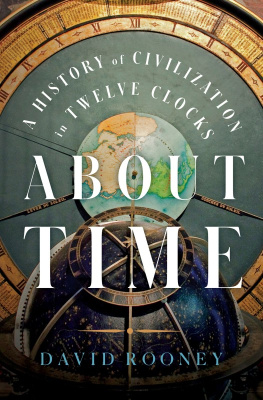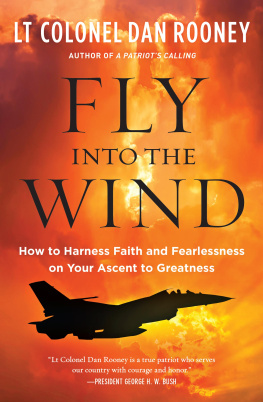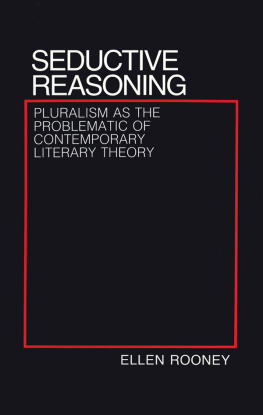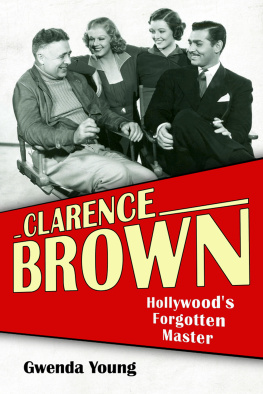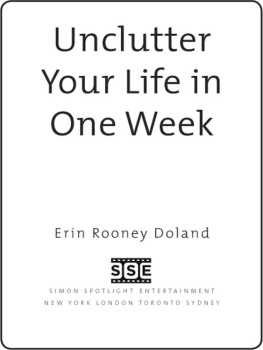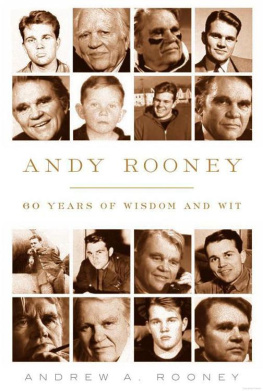
Mickey Rooney
A Show Business Life
JAMES A. MACEACHERN

McFarland & Company, Inc., Publishers
Jefferson, North Carolina
LIBRARY OF CONGRESS CATALOGUING DATA ARE AVAILABLE
BRITISH LIBRARY CATALOGUING DATA ARE AVAILABLE
e-ISBN: 978-1-4766-2682-6
2017 Estate of James A. MacEachern. All rights reserved
No part of this book may be reproduced or transmitted in any form or by any means, electronic or mechanical, including photocopying or recording, or by any information storage and retrieval system, without permission in writing from the publisher.
Front cover image of Mickey Rooney in the 1950s (Photofest)
McFarland & Company, Inc., Publishers
Box 611, Jefferson, North Carolina 28640
www.mcfarlandpub.com
Acknowledgments
My sincerest thanks to the following people for their contributions to this book: Fred Roos, Carroll Ballard, Kelly Reno, Tim Farley, Barry Morrow, Corey Blechman, Lane Wyrick, Roger Corman, and Carl Reiner. I also want to give special thanks to Dick Rockwell for decades of stimulating conversations about movies, and my friend Jelena Krstovic for her encouragement and support.
Introduction
Much has been made about the extraordinary longevity of Mickey Rooneys career. But its not just for his endurance that he will be remembered. There is an amazing body of work to be found, if one knows where to look. In some ways Rooneys incredible versatility has made it more difficult to assess his merits as an actor. In fact, most people think of him as primarily a comedian or, more broadly, as an entertainer. His career encompassed every facet of show business, from vaudeville to radio to films, TV, and even nightclubs. He could do so many things wellsinging, dancing, playing the drums and piano, doing impressions, playing both comedy and dramathat critics and the audience lost sight of the fact that, at his core, he was, as Laurence Olivier stated, The greatest actor America has produced. Wonderful performances in 1950s film noirs and supporting roles that saved otherwise routine World War II dramas and service comedies might have gained critical attention earlier if Rooney were not also headlining in Las Vegas or doing The Mickey Rooney Show on television, or making headlines by filing for bankruptcy or getting sued for his umpteenth divorce.
Why Mickey Rooney? Ive been asked that question many times. I had some personal interest because he reminded me a bit of my dad, who was also of small stature, had a Scottish heritage, and only received a fifth-grade education. (Rooney, of course, had very little formal education and probably never read anything but scripts and the racing form.) When I was growing up, Rooney was always on TV, either in some old movie or doing a guest shot on a game show, a talk show, or as a dramatic actor on many of the top serieseverything from Combat! to Wagon Train.
But as much as he was omnipresent on the tube and as many times as he went on and on about how he had been the number-one box-office star in the world, you never got the feeling of knowing who he really was. His basic life storyabout how he had been on the stage since he was a toddler and was making movies by the time he was six, and how he became a big star working for MGM, and was infamous for his many marriageswas generally known, but the guy who seemed to be everywhere never seemed to be a real human being. He always appeared to be a creation of the movies. He was every bit a fabrication, much like Mickey Mouse, who, Rooney claimed, was named after him. He was always living out some male adolescent fantasy. He married and was divorced by many beautiful women, including Ava Gardner for Chrissake. In what universe does a very short, ordinary-looking, not all that intelligent man end up marrying one of the most beautiful women in the world and then get divorced because he was cheating on her? It can only happen in the movies, right?
Mickey Rooney is fascinating because he continued to get married, despite the fact that he kept ending up in divorce court. He continued to bet on the horses when he had no money to bet with. He continued to talk nonsense to the press and in TV interviews when anyone could tell him that his best path was to just shut up. And he continued to make bad movies and take part in one misguided play or business venture after another, smiling through it all. And yet, just when everyone had given up on him, he would somehow knock everybody out with a live dramatic performance like The Comedian, or surprise us with a hilarious guest shot on a comedy series. He persevered and endured longer than any other performer in the history of show business. It was a shock when he passed away because it didnt seem like he would ever die.
I dont think anyone knew the real Joe Yule, Jr. (Mickeys original name) or Mickey McGuire (his legal name, briefly, in the late 1920s and early 30s), least of all Mickey Rooney. Andy Hardy, Whitey Marsh, Baby Face Nelson, Killer McCoy, Homer Macauley, Mickey Moran, Sammy Hogarth, and Bill Sackter all became real to their audience because of Rooneys genius as a performer. The great actors like Olivier and Brando got to play all the signature roles from Shakespeare to Tennessee Williams to ONeill but, in the end, even they knew that the acting profession is a childs game and its essence is about pretending to be someone else. One of the greatest filmmakers of all time, Ingmar Bergman, once said, Actors who dont have a direct connection to their childhood are not good actors. They are boring intellectual actors.
Joe Yule, Jr., Mickey McGuire, and Mickey Rooney were not intellectual actors; they just loved to pretend.
CHAPTER ONE
Born in a Trunk
Look, I come from vaudeville, I come from burlesque, I come from heartaches, I come from sadness, I come from gladness, I come from work and sweat and respect for the craft.
Mickey Rooney, 1998
Mickey Rooney was born into show business, more precisely into the world of vaudeville and burlesque. The entertainment focus in burlesque was much narrower than vaudeville. It was more about the scantily clad girls and lowbrow comics. Burlesque at the time of Rooneys birth was still rather innocent and did not feature the nudity of more recent memory. Still, burlesque was considered to be vaudevilles poor cousin, and many considered it to be about one step above the circus. There were hawkers going through the audience selling candy and Cracker Jack and, if you were lucky, you could even win a prize.
Mickeys father, Joe Ninian Yule, Sr., was born in Edinburgh, Scotland, and immigrated to Brooklyn with his mother and older brother Jim when he was about six years old. Joes mother died shortly after arriving in America and left him and his brother to fend for themselves. Young Joe found some work as a child actor in stage melodramas like The Slaves of New York and The Volunteer Organist. He entered the Army in 1917 when the U.S. joined the war against Germany, and fought in France. After the war he got a job in burlesque as a property man for a company called Jack Reids Record Breakers.
***
American burlesque and vaudeville really began with minstrel shows, dating back to 1830. The first producer of such shows was Thomas D. Rice, who put together songs and dances around a unifying theatrical pattern. All the performers in these minstrel shows were white men who applied burnt cork to their faces to simulate Southern blacks during the plantation era. Rice introduced what would become a racial (as opposed to racist) stock character, the eager-to-please, shuffling, childlike negro. This character would endure for another century, not only in minstrel shows but also in vaudeville, on radio and early television, particularly on the enormously popular
Next page
